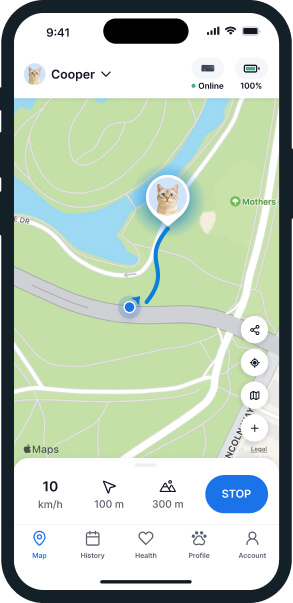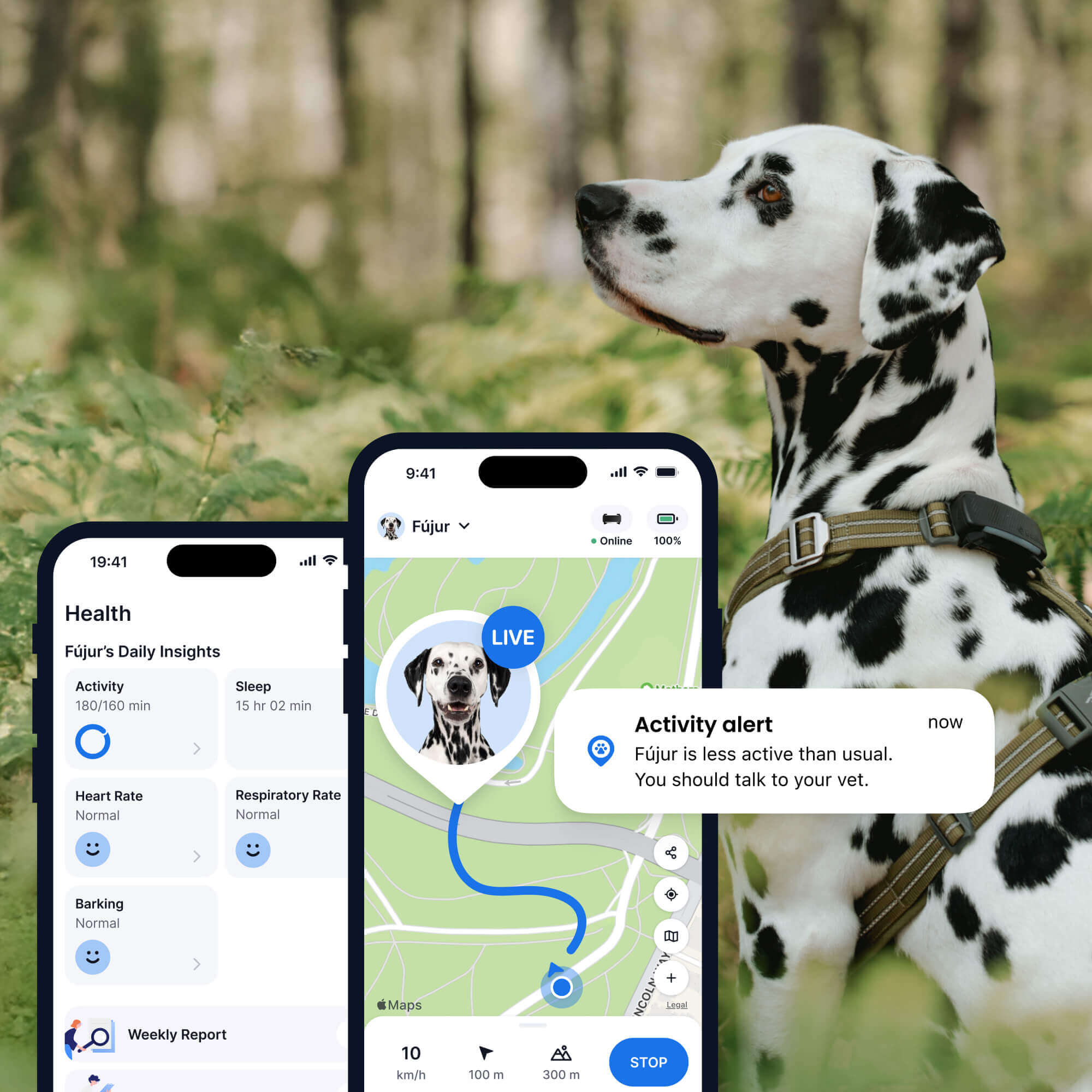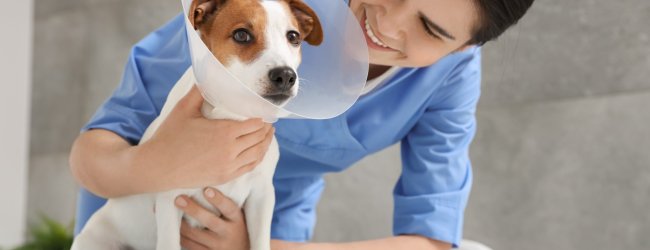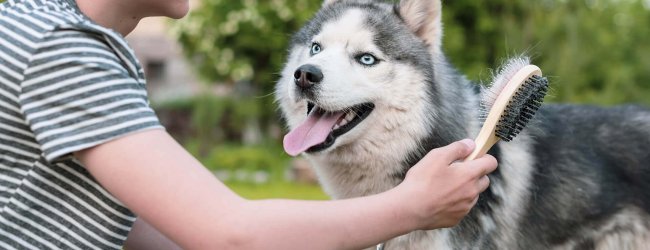 Approved by Dr. Dwight Alleyne, DVM
Approved by Dr. Dwight Alleyne, DVM Can Pets Get COVID? Your Questions, Answered
As COVID-19 cases continue to rise this fall, it can be easy to miss out on the signs your cat or dog is sick. Here's everything you need to know about COVID-19 & how to keep your pets safe.
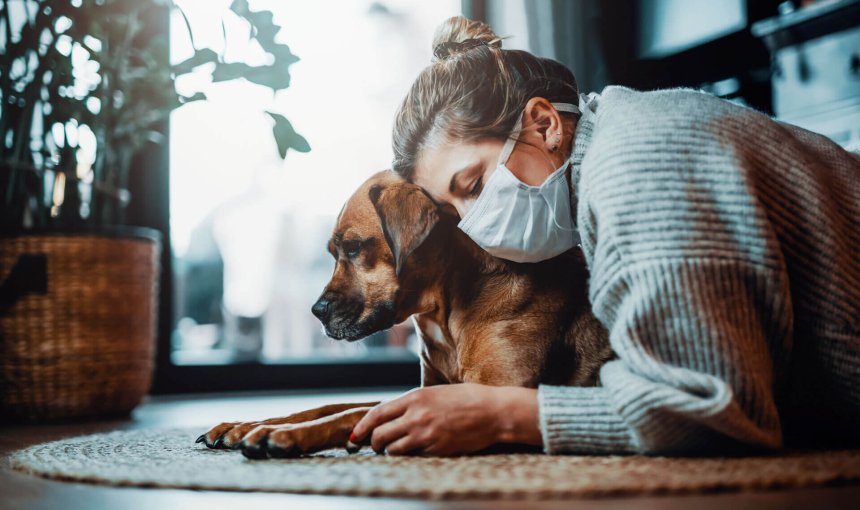
With folks falling sick as we all return from vacation, it can be disheartening to check the news or hear from your loved ones that COVID-19 cases are rising again. But with that said, you might also be wondering: can pets get COVID? And if yes, how can you manage it? In this post, we’ll answer your questions about dogs, cats, and the coronavirus below -plus, how you can spot an illness in your pet early on by tracking their daily activity, so you can get them to a vet much before they get worse.
Key Takeaways
Yes, pets can get COVID-19 from humans via droplets spread from close contact. No, neither dogs nor cats are likely to spread COVID-19 to humans.
If you suspect your pet has COVID-19, call your vet right away.
In all cases, take the same precautions around your pet as you would around a sick family member.
Avoid letting your pet wander outdoors until they fully recover. A Tractive smart pet tracker can help you prevent them from escaping outdoors and even spot potential health issues early.

Always know your buddy is healthy & safe
Read more- Key Takeaways
- So, can pets get COVID?
- Can my dog get COVID from me? Or my cat?
- Can pets infect humans with COVID?
- COVID-19 symptoms in dogs & cats
- What to do if you think your pet has COVID -19
- What not to do if you think your pet has COVID-19
- Do I need to tell someone if my dog or cat has COVID-19?
- What to do if I need to isolate myself?
- Do pets need to go into isolation as well?
- Should your pet get the COVID vaccine?
- How can I tell if my dog or cat is sick – if they seem normal?
- How a smart pet tracker can help
So, can pets get COVID?
Yes – despite early reports, it’s now clear that both dogs and cats can be infected by COVID-19.1 There have been several cases documented in the United States and elsewhere. But on the bright side, it doesn’t seem to happen often. And even better, most pets infected with COVID-19 have only a mild illness and usually fully recover.1 It’s only in very rare cases that pets develop a serious illness from the virus that causes COVID-19.
Can my dog get COVID from me? Or my cat?
Yes. According to the CDC, the COVID-19 virus can spread from people to animals with close contact.2 This is usually a result of your dog or cat coming in close contact with someone already infected by the virus. So besides keeping your family and loved ones safe, do keep in mind that your pets are also vulnerable.
Can pets infect humans with COVID?
No. According to the CDC, there’s a low risk of people getting infected by the COVID-19 virus from pets. There’s also no evidence that the coronavirus can spread to people through your pet’s skin or fur.
However, the COVID-19 virus is most likely to be spread human to human, when germs are passed on via droplets while coughing, sneezing or speaking at a close distance. So the risk of animals passing on the virus to humans is now considered to be very low. At the same time, your dog or cat might pick up the virus if you cough or sneeze close to them – or they come close for a cuddle anyway.
That’s why the WHO still recommends washing hands with soap and water after contact with house pets, just to be on the safe side. That can also protect you from nasty bacteria like salmonella or e-coli. We know it’s tough, but this means it’s best to resist the urge to cuddle and comfort your furry friend in case they’re sick.
Read more: Can Dogs Get Sick From Humans? (And Vice Versa?)
COVID-19 symptoms in dogs & cats
It can be hard to spot COVID-19 in dogs due to its symptoms being quite similar to the flu. Besides, it’s more likely that dogs and cats may experience a symptom-free version.
However, some symptoms experienced by a dog or cat with COVID-19 may be:
What to do if you think your pet has COVID-19
If you suspect your dog or cat may have COVID-19, it’s best to first call your vet. They may recommend isolating your pet at home or another treatment plan. Avoid cleaning your pet with products like disinfectants, alcohol, hydrogen peroxide, hand sanitizer, or cleaning wipes. Keep them indoors if they’ve tested positive and monitor their symptoms – especially how active they are.
Generally, your pet can go back to their normal routine if:
- They show no symptoms for at least 72 hours without medical care
- And it’s been two weeks since their last positive test – or if follow up tests for an infection are negative.
What not to do if you think your pet has COVID-19
⚠️ Never surrender, euthanize, or abandon your pet in case they do get infected with COVID-19. The chances of them spreading the virus are low and you’re unlikely to get infected by them. Also avoid putting a mask on your pets, as this might harm them over any good.
If you’ve tested positive for COVID and your pet becomes sick, it’s better not to take your pet to the vet by yourself. Rather, it’s better to call your vet, let them know you’re sick, and request if they can advise you over the phone or email. Your vet should be able to provide you some simple, practical steps for caring for your sick pet.
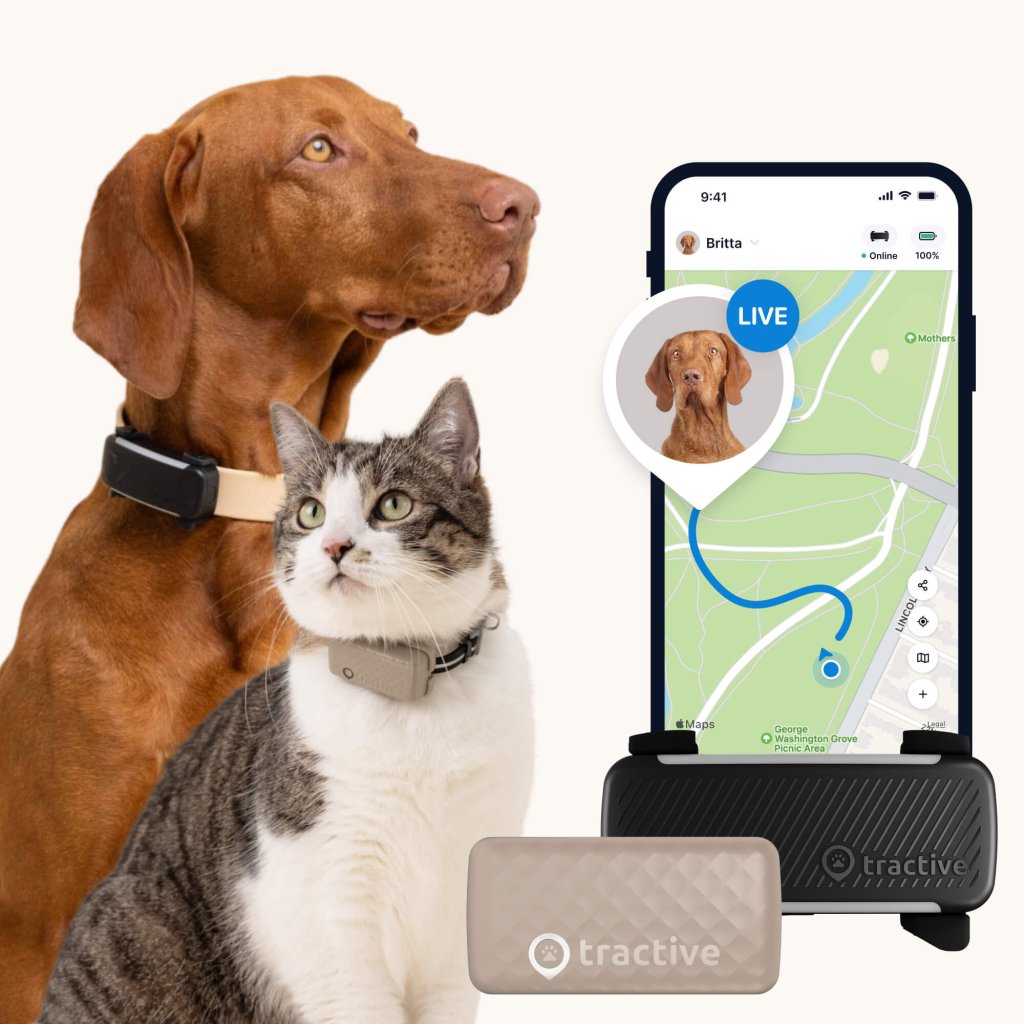
Keep your pets healthy & safe
Get real-time location information, wherever they go. See how much – or how little – activity they’re getting. And get Health Alerts if something might be wrong.
Do I need to tell someone if my dog or cat has COVID-19?
If your dog or cat has COVID, treat it the same way as if you’ve tested positive yourself. Inform your friends, family, or anyone else you know your pet might have interacted with. (So they can immediately get tested and seek treatment.)
The CDC doesn’t recommend routinely testing your pets for COVID. So if you’ve noticed any concerning signs, keep your vet in the loop. (Especially to rule out any other, seasonal respiratory illnesses.)
What to do if I need to isolate myself?
As a pet parent, it’s good to prep ahead for your four-legged friend as well as for yourself. Here’s some advice from RSPCA UK:
“While you are ill, another member of your household will need to take care of your animals. They will need to follow good hygiene practices washing their hands thoroughly after contact and any of their items e.g. bedding, food bowls.“
If you’re living on your own, or need support outside of your household, it’s best to designate friends, family members or neighbors who can help in advance. But if that’s not an option, you can look into trustworthy pet sitting sites like Petsit or Pawshake. Community Facebook groups are also worth looking into. You can also always contact animal charities like ASPCA or Dog’s Trust UK to get some guidance.
Don’t forget: Have all your dog or cat’s medication and diet needs, veterinary details – and any other important information – all in one place so you can share quickly if needed.
Do pets need to go into isolation as well?
Depending on your pet’s symptoms, your vet might advise you to isolate your pet at home. And as with humans, the isolation period is 2 weeks. But if isolating at home isn’t an option, consider finding a veterinary facility near you that offers isolation units.
If you’re able to care for your pet at home, keep them in a secure, familiar environment. Do your best not to let them out, except to get medical care. Treat them like another sick family member at home and take the same precautions. (Like wearing a mask, using gloves when interacting with your pet, and washing your hands frequently.)
Above all, do your best not to let your pet wander – yes, even if they’re an outdoor pet.
“Cats should be kept inside.
Do not allow cats that have tested positive for the virus that causes COVID-19 to roam outside.”
– CDC4
Should your pet get the COVID vaccine?
While researchers around the world have some promising results, most vets don’t consider it necessary to vaccinate pets against COVID.5 There’s simply little to no evidence that dogs and cats play such a major role in spreading the virus. So any such vaccine wouldn’t bring much value from a public health standpoint.
How can I tell if my dog or cat is sick – if they seem normal?
Usually, one of the first signs your pet isn’t feeling well is if they seem less active than usual. They might be more reluctant to go for walks or play together – and you might notice them napping more. (Or even retreating to hide more than usual.)
It’s why vets recommend tracking your pet’s activity levels, or how much they can keep up with you. This can help you catch on to a dip in their regular activity early on – and get your dog or cat the help they need before their health takes a turn for the worse.
“Keep track of your dog’s energy levels, especially how long they are able to walk.
If you notice significant declines, it could be a sign of pain, heart disease, or other illness.”
– VCA Animal Hospitals6
How a smart pet tracker can help
If your pet has been exposed or you are isolating, a smart pet tracker can be a crucial tool for both location safety and monitoring their health status. If you’re isolating, your dog or cat might accidentally slip out when you’re distracted or someone’s unwell. In these cases, just switch to LIVE tracking via your Tractive mobile app – so you can locate them right away and bring them home.
You could also set up a Virtual Fence around your home or yard provides an extra safety layer. If your pet leaves their safe zone while you are resting or isolating, you get an immediate escape alert so you can safely secure them.
Your tracker can also help you spot potential health issues early – usually from easy to miss signs like a drop in your pet’s activity or disturbed sleep. With its built-in motion detector, it establishes a baseline for your dog’s or cat’s normal activity and sleep patterns. If they are fighting any illness – including a viral one – they will often become noticeably more lethargic, rest more, and may sleep poorly.
If your tracker detects a big, sudden change in their normal routine, you’ll receive an instant Health Alert. This acts as an early warning system. Now you’ll have objective data to share with your vet, helping you catch on to an illness before it has a chance to worsen.

We’re always doing our best to keep this guide up to date. However, this is a fast-moving topic, so we’ll consistently update it as new information arises. This also lets us make sure it’s accurate, safe and helpful to you.
And if you found this article helpful, share it with your fellow pet parents. So you can build a healthy community and keep each other informed – for pets and pet parents both.
Your furry friend’s health and wellbeing means as much as to us as it does to you. So we’ve made it a priority to only share medically-relevant content on our blog. This post was checked, double-checked, and medically verified by Georgia-based vet, Dr. Dwight Alleyne.

Dr. Dwight Alleyne, DVM
Originally from Long Island, New York, Dr. Alleyne began his career at a no-kill animal shelter before becoming a licensed veterinary technician. He graduated from Cornell University Veterinary College in 2006 and completed an internship at Purdue University. Now practicing in Georgia, Dr. Alleyne specializes in soft tissue surgery and ultrasounds. He also writes pet health articles on his website, “The Animal Doctor Blog” (www.anmldrblog.com).
